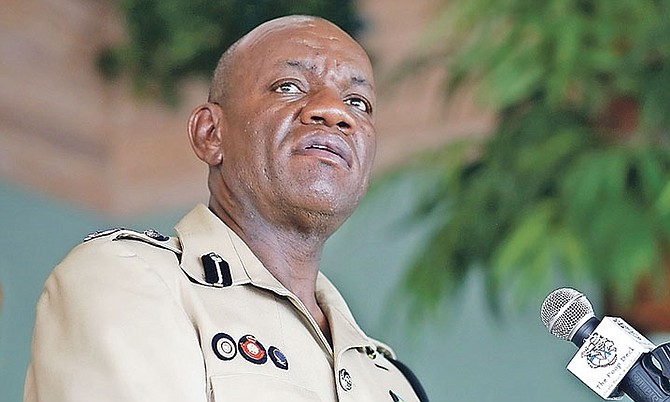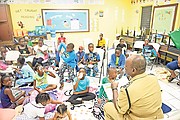By RICARDO WELLS
Tribune Staff Reporter
rwells@tribunemedia.net
“NO, it wasn’t just the uniform for me. It was the attitude and professionalism of the first officers I came into contact with. It was my admiration for them and how they treated my family during a very serious time, that’s what drove me to the Royal Bahamas Police Force,” was how outgoing Senior Assistant Commissioner of Police Stephen Dean summed up his initial interest in the organisation he would help develop over a 38-year period.
With the announcement of his pre-retirement vacation being announced a few weeks ago, the man has spent a great deal of his time aiding the press, agreed to sit down with The Tribune to discuss his legacy in law enforcement.
Sitting upright and relaxed in the same chair he spent so many stressful days and nights in, Mr Dean said he was happy that his time to ride off in the sunset had come.
The boy from Eight Mile Rock who had his house broken into several times, has achieved his life long dream.
Dean started in his career in the Criminal Investigation Department in Grand Bahama. After eight years, he was transferred to drug enforcement.
After some time there, and a few short stints in Cat Island and New Providence, Dean said he was moved to Mayaguana. Despite his initial dread, he said the move “fundamentally changed” him.
Recalling his time in a small office with no electricity and two other officers, it was here where Dean said he became “a true officer”.
“I had to learn quickly that city policing could not work, I was in a completely different world.
The lack of actual criminal cases, according to Dean, often meant that officers assigned to family island communities had “step up” in different way.
“The culture was different. I remember going to church my first couple of weeks there. I got all dressed up. I though on my best suite, best shoes and went down to the church. Boy did I hear about that; the talk came quick because many in the community felt a way about me after that,” he said
“In the family islands, a police chief became the physical representation of law and order. They were needed at the schools, churches, office buildings, ceremonies and all of that.
“We weren’t trained to know that back then. We were told when we were sent out, keep things in line and don’t mess up. That was it,” he added.
“But that job prepared me for what was to come. The foundation of my community work started there. It wasn’t about walking around all big and strong as if you were above the people, you became more sensitive to the issues and more oriented to helping.”
After an eight year stint in Mayaguana, Dean eventually made his way back to Nassau.
It was this stop, under the tutelage of future Commissioner of Police, the late B K Bonamy, that Dean said the skills he developed in Mayaguana flourished.
The onset of 1980s drug epidemic was beginning to give way to the 1990s gang culture. Dean said the strong-arm practices of the RBPF needed to change.
“Crime had change and the force had to change with it,” he said. “We needed officers that were more educated, not just a man in a uniform. The criminals were different. We moved away from being a reactive organisation to, with more technology, research and education, to a proactive agency.
“We viewed it, on the heels of the drug years, in order to get a grapple on crime we had to get a grapple on our communities; especially our children. Hence you saw more initiatives and programmes come on stream where police would take up more of service role.”
Dean admitted that throughout the 80s, 90s and early 2000s; the drug years and gang years, it was those educated, service oriented officers that made the difference.
“I get emotional when I talk about those years because it was around that time when we saw the home structure the Bahamas always had, start to fade and fall apart. The drug dealers and gang leaders had truly surpassed the church leader and police and doctors as the common place role model,” he said.
“Those years really did a number on the Bahamas and for many police officers, we had the worst seat,” he added.
Dean recalled circumstances where he would visit homes so ravaged by drugs and gangs, he would encounter teenagers left to raise their younger siblings.
He said this factor often bleed into other, more major issues that contributed to crime.
“Many times, I know for me it hurt because one day it was a 12-year-old lingering around with no one home, to a few years later he’s now a 16, 17-year-old with a gun or knife and pocket full of drugs.
“That bothered me because most of the time it wasn’t a bad choice that made him a criminal, it was the lack of opportunities. I, like many other officers around that time, wanted to carry more to those areas than just men, cars and handcuffs.
“We wanted to take books, pencils; computers and classes and programmes and food and uniforms and in some cases, for some officers, money.”
Of the dilemma, he added: “It worked in some places, but were it didn’t, the results were often fatal.”
Reactions to this, according to Dean, laid the ground work for what became Urban Renewal.
He said police, through government mandates, attempted to rebuild the social fibres of inner city communities.
The initiative was first launched as a pilot project in the constituency of former Prime Minister Perry Christie, in June 2002.
The community was targeted because it featured high rates of crime and other social ills.
Within just six short weeks of its inception, police officers assigned to the Farm Road Project visited every household and business establishment in the community. They collected data and intelligence on environmental concerns, health issues, housing problems and criminal activities.
Reminded of that launch, Dead told The Tribune: “The intention was so good there. We realised that our communities were hurting because homes were falling apart all around us.”
He continued: “You can say what you want about that initiative, but before you speak ill of it, go and speak to the children and families saved by that programme.”
“We needed a way to alleviate the social ills. In my opinion, this was the only way to do that. The practice I had in Mayaguana, knocking on doors, sitting in living rooms, talking with residents; that was the community policing I used when I got back in Nassau. I didn’t save everyone, but I tried. We did what we could with the resources we had, again just like how we did it in Mayaguana.
“You’re talking about joblessness, poor living conditions; a number of other things. We worked through these setback and attempted to work with and develop the next generation; just like I did from my small office, with no electricity back in Mayaguana.”
Dean said when he looks back at his career, it would be these two periods that he remembers most.
He said the impact his time in Mayaguana and years in community police has had on his life, has shaped him as a man.
“You need to have a heart when you come into this service. That’s the message I give to every recruit I talk to. You have to love people and have your love for people drive you in the way you do things,” he added. “That’s what policing has always been to me; that’s it.”






Comments
licks2 5 years ago
Sir stop making yasef look like a foolish doofus. . .what is ya complaint. . .one year and half vacation accumulated. . .38 years with a 40 years absolute limit. . .you expected that you would be told to leave because of the problem to be addressed. . .YET IT HURT WHEN THE INEVERTIBLE CAME. . .TIME TO GO BRO!! He will be on the PLP ticket come next election. . .other wise he would not open his mouth. . .no reason to. He was one of the "PET BOYS" of Perry Christie's Urban Renewal project in the PM's constituency when he was a junior officer. . . he was rocketed to the top over other officers. . .he started on the top from there. . .always gave the impression that there was the police force and then there was Stephen Dean and Steven Seymour. . .wo renegades created by PGC. . .two officers that the force had no jurisdictions over!!
He had his turn. . .his run was very beneficial for him. . .he must remember that under his tenure. . .even after given all the freedom to perform by PGC, the crime rate consistently rose to record rates, year after year!! Between 2012 to 17 UR was a disaster. . .plenty tiefing, killing records and crime rise every year. . .heck the UR worker were tiefing the money themselves. . .all under Mr. Dean!
Now public services rule tell him he has to go and he feel hurt. . .even though he knew that it was coming this year. . .HOW THEY DID IT WAS WRONG!!!
I don't know how to tell Mr. Dean that he had to carry his tail that he did not feel bad!! BY NOW EVERYBODY WHO KNOW HOW PUBLIC SERVICES WORKS AND THE NONSENSE MR DEAN TALKED. . .HE IS CAMPAIGNING FOR A CANIDACY IN THE PLP.
Well_mudda_take_sic 5 years ago
Most of us feel the same way about 'one-and-done' Minnis who has been PM less than 2 years. LMAO
moncurcool 5 years ago
You need to read the article. He is not complaining about going, he is more talking about being hurt by the people they were not able to help.
sheeprunner12 5 years ago
LOL ....... he could go and cuddle up all day and night with Perry now!!! ....... Both are happily retired with big Treasury pensions coming each month.
Greentea 5 years ago
what a poorly transcribed interview- "I though on my best suite" really? good grief.
John 5 years ago
Come next election I not voting for anybody over 60 and that includes Donald Trump
Sign in to comment
Or login with:
OpenID